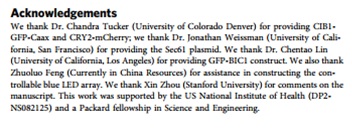What to include in your Acknowledgments section
Most academic papers have many people who have helped in some way in the preparation of the written version or the research itself. This could be someone from a sponsoring institution, a funding body, other researchers, or even family, friends or colleagues who have helped in the preparation. These people need to be mentioned in the Acknowledgments section of the paper.
Acknowledgments section in different academic documents
The Acknowledgments section is present in both a paper and an academic thesis. For papers, the Acknowledgments section is usually presented at the back, whereas in a thesis, this section is located towards the front of the manuscript and is commonly placed somewhere between the abstract and Introduction. However, the exact location varies between each university, as each establishment possesses its own style guide for theses and student submissions. So, it is always worthwhile consulting your university’s academic style guide before writing a manuscript for undergraduate/postgraduate submission.
Acknowledgments section in theses
For academic theses, there is no right or wrong way to acknowledge people, and who you want to acknowledge is down to personal preference. However, the common types of people authors acknowledge in their academic theses include:
- Supervisor’s contributions
- Research group (especially if the thesis in question is a master’s and the work is helped along by a PhD student)
- Support staff (laboratory technicians, etc.)
- Any students who undertook side projects with them (e.g. final year undergraduates, summer students, master’s students)
- Administrative staff (there can be a lot of bureaucracy for thesis submissions)
- Referees that got them onto the course (postgraduate only)
- Funding bodies
- Any collaboration with industry and the people they worked with at said establishment(s)
- Friends
- Colleagues
- Family
Acknowledgments section in journal papers
Now, whilst university manuscripts can include any combination of the above (including all and none in some cases), academic publications in journals more commonly acknowledge the same kind of people/organizations, but again it is up to the author(s) what they feel should be acknowledged; not every piece of help needs to be acknowledged, just the most useful/prevalent help. Also, acknowledgments should be written in the first person.
Examples of whom and what should be acknowledged in a journal publication are listed below:
- Direct technical help (e.g. supply of animal subjects, cells, equipment setup, methods, statistics/data manipulation, samples, chemicals/reagents, analytical/spectroscopy techniques)
- Indirect assistance (topical and intellectual discussions about the research which can lead to generation of new ideas)
- Affiliated institutions
- Funding bodies
- Grant numbers
- Who received the funding (if not the author, e.g. a supervisor)
- Any associated fellowships
Whom to acknowledge - and whom not to acknowledge
- Other authors/contributors: It is not common practice for the lead paper writer (i.e. the person writing and publishing the manuscript) to acknowledge the other authors/direct contributors to the paper. Only those who are not recognized as authors may be thanked and acknowledged.
- Reviewers: Authors are also not allowed to thank reviewers personally, or those who inspire them but cannot directly receive their appreciation – although reviewers can be thanked if they are kept anonymous.
- Friends and family: Unlike university manuscripts, journal manuscripts should not include help and guidance from family and friends.
Other acknowledgments
- Titles and institutions: Titles such as Mr, Mrs, Miss, etc. are not commonly included, but honorary titles such as Dr, Professor, etc. are. The institutions of the acknowledged people are usually mentioned.
- Dedications: In addition, work dedicated to people directly, such as those who are deceased, may be included in the Acknowledgments section, but this must be done in a certain way and the appreciation put into an open dialogue.
For example, the following would not be acceptable:
We dedicate this work to the deceased Prof. Bloggs.
However, the following would be acceptable:
We acknowledge Prof. Bloggs for discovering the secret of anonymity.
Additional pointers for writing the Acknowledgments section
- The tone of the section should be in an active voice.
- Do not use pronouns indicating possession (i.e. his, her, their, etc.).
- Terms associated with specific companies should be written out in full, e.g. Limited, Corporation, etc.
- If the results have been published elsewhere, then this should also be acknowledged.
- Any abbreviations should be expanded unless the abbreviation appears in the main body of the text.
Examples
Below are examples of the Acknowledgments sections taken from a couple of papers from Nature Communications:


Sources:
Duan L., Hope J., Ong Q., Lou H-Y., Kim N., McCarthy C., Acero V., Lin M., Cui B., Understanding CRY2 interactions for optical control of intracellular signalling, Nature Communications, 2017, 8:547
Xu Q., Jensen K., Boltyanskiy R., Safarti R., Style R., Dufresne E., Direct measurement of strain-dependent solid surface stress, Nature Communications, 2017, 8:555
Summary
Many people think that the Acknowledgments section of a manuscript is a trivial and unimportant component. However, it constitutes a vital means to ensure that all affiliated support for the paper can be duly and transparently mentioned. By acknowledging people for their efforts and contributions, you demonstrate your integrity as an academic researcher. In addition, crediting other people for their help can also increase their presence in the academic world and possibly help to boost their career as well as your own.
Maximise your publication success with Charlesworth Author Services.
Charlesworth Author Services, a trusted brand supporting the world’s leading academic publishers, institutions and authors since 1928.
To know more about our services, visit: Our Services